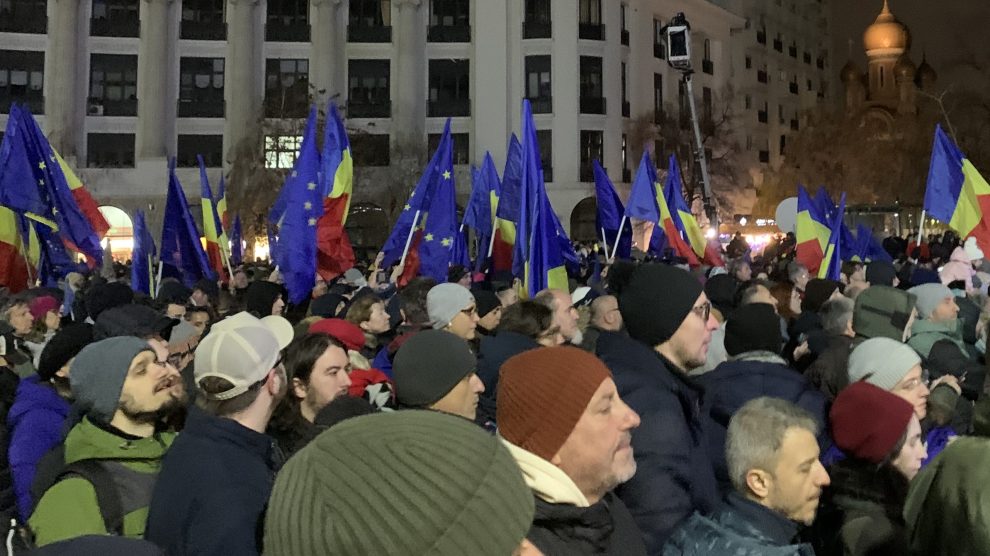At first glance, Romania’s 2025 political landscape might seem unsettling, but the country remains a sound bet for international investors and partners.
In 2024, buying Romanian debt seemed straightforward. The PSD leader, Marcel Ciolacu, serving as prime minister, aimed for the presidency, while a former PNL prime minister, Nicolae Ciucă, hoped to face him in the run-off.
The results of the June local and parliamentary elections suggested a stable path forward, with prospects for a renewed coalition.
However, Romania, like much of the world, fell in line with the global trend of anti-incumbency. The political aspirations of PSD and PNL leaders crumbled as two outsider candidates advanced to the presidential run-off.
One of them presents significant geopolitical risks, raising the critical question: Is Romania still a safe bet for international markets and investors?
- Romania faces parliamentary stalemate
- Rethinking the fight against disinformation in the Black Sea region
- Reinventing rural development in emerging Europe
At first glance, Romania’s 2025 political landscape might seem unsettling. The once-straightforward dynamics of 2024 have given way to a more fragmented reality. While this might raise eyebrows, I would argue, Romania remains a sound bet for international investors and partners.
The main concern is whether a radical president like Calin Georgescu, known for his controversial positions, could upend Romania’s Euro-Atlantic commitments.
Georgescu has stated that he would halt all assistance to Ukraine, including blocking the use of Romanian ports for Ukrainian grain exports.
He has also questioned—then bounced back, like all populists do—Romania’s role in the EU and NATO, expressing doubts about maintaining the 2.5 per cent defence spending target. Despite claiming to be a strong supporter of Donald Trump, he has criticised the US-built ballistic missile defence system at Deveselu is the south of Romania.
Moreover, he has hinted at the potential nationalisation of foreign-owned assets in Romania, particularly in the utilities sector. His vision leans toward economic autarky, often laced with religious rhetoric, mysticism, and troubling praise for figures associated with the Romanian Holocaust. Despite these serious concerns, Romania’s trajectory remains firmly anchored in the Euro-Atlantic alliance.
The balance of power
Romania’s constitutional framework ensures a balance of power. While the president has significant influence in defence and foreign policy, real power lies with the prime minister and parliament.
Importantly, 80-90 per cent of Romanians remain steadfast in their support for EU and NATO membership. This broad consensus serves as a formidable check against any potential deviation from Romania’s pro-European path.
After the political shock of the presidential first round, parliamentary elections signaled a return to stability. A pro-European coalition comprising PSD, PNL, USR, and UDMR now controls two-thirds of the legislature.
This coalition can effectively contain radical forces, even if Georgescu wins (his opponent, the USR’s Elena Lasconi may still win, as well). Parliament has the constitutional power to impeach a president who threatens democratic norms or foreign policy commitments, subject to confirmation by a public referendum.
Romania always delivers in the end
Romanian politics, for all its unpredictability, tends to self-correct. The recent formation of a broad coalition underscores this pragmatism.
While governing will be challenging, the coalition parties understand the stakes, particularly regarding fiscal responsibility and avoiding early elections—a scenario Romania has historically avoided.
Regardless of who becomes president, Romania’s leadership is acutely aware of its budget deficit and debt concerns. The political establishment knows the risks of instability and is committed to maintaining market confidence. The new coalition’s stability signals continuity and a focus on fiscal discipline.
In summary, while the rise of a radical right candidate may cause alarm, Romania’s institutions, political pragmatism, and popular commitment to Euro-Atlantic values provide reassurance.
Brussels and international markets can take comfort in the country’s deep-rooted stability mechanisms and its clear alignment with democratic and European principles.
Even a radical candidate with questionable ideas and a shaky commitment to democracy can be contained (unless he chooses faster a Melonisation track, and there is less need to contain)—but let’s hope Sunday’s election brings a positive surprise.
Remember, Romania always delivers in the end, and this is the signal beyond the noise.
At Emerging Europe, we use an integrated approach centred around market intelligence to help organisations understand trends and strategically position themselves for success.
Learn how our solutions can help you thrive in the region:
Company and Services Overview | Strategic Advantage.

